Understanding and nurturing a child's social skills can be one of the most rewarding yet challenging aspects of parenting, especially for those raising children on the autism spectrum. With the right strategies, parents can play a pivotal role in enhancing their child's interpersonal abilities, fostering confidence, and creating meaningful connections. But what specific approaches can parents adopt to effectively support their child's social development?
This article dives into ten impactful strategies that not only empower parents but also pave the way for their children to thrive socially. Let’s explore this together!
At Rori Behavioral Innovations, we understand the unique challenges that parents face when implementing effective strategies for parents to help their child with autism develop social skills. That’s why we use Applied Behavior Analysis (ABA) therapy to create individualized treatment strategies that focus on improving interpersonal skills in youth. Each plan is crafted with care, following a thorough evaluation to ensure it meets your child’s specific needs and strengths.
This personalized approach incorporates effective strategies for parents to help their child with autism develop social skills, aiming to enhance interpersonal abilities while also setting behavioral goals that encourage overall growth and independence in social interactions. Research shows that customized interventions can significantly boost engagement and outcomes. In fact, studies reveal that young individuals who receive intensive, tailored ABA therapy often make remarkable strides in communication and social skills.
At Rori Behavioral Innovations, we’re dedicated to providing personalized care because we understand that effective strategies for parents to help their child with autism develop social skills and tailored approaches are key to effective therapy. This commitment leads to successful outcomes in skill development, and we’re here to support you every step of the way! Let’s explore this journey together!
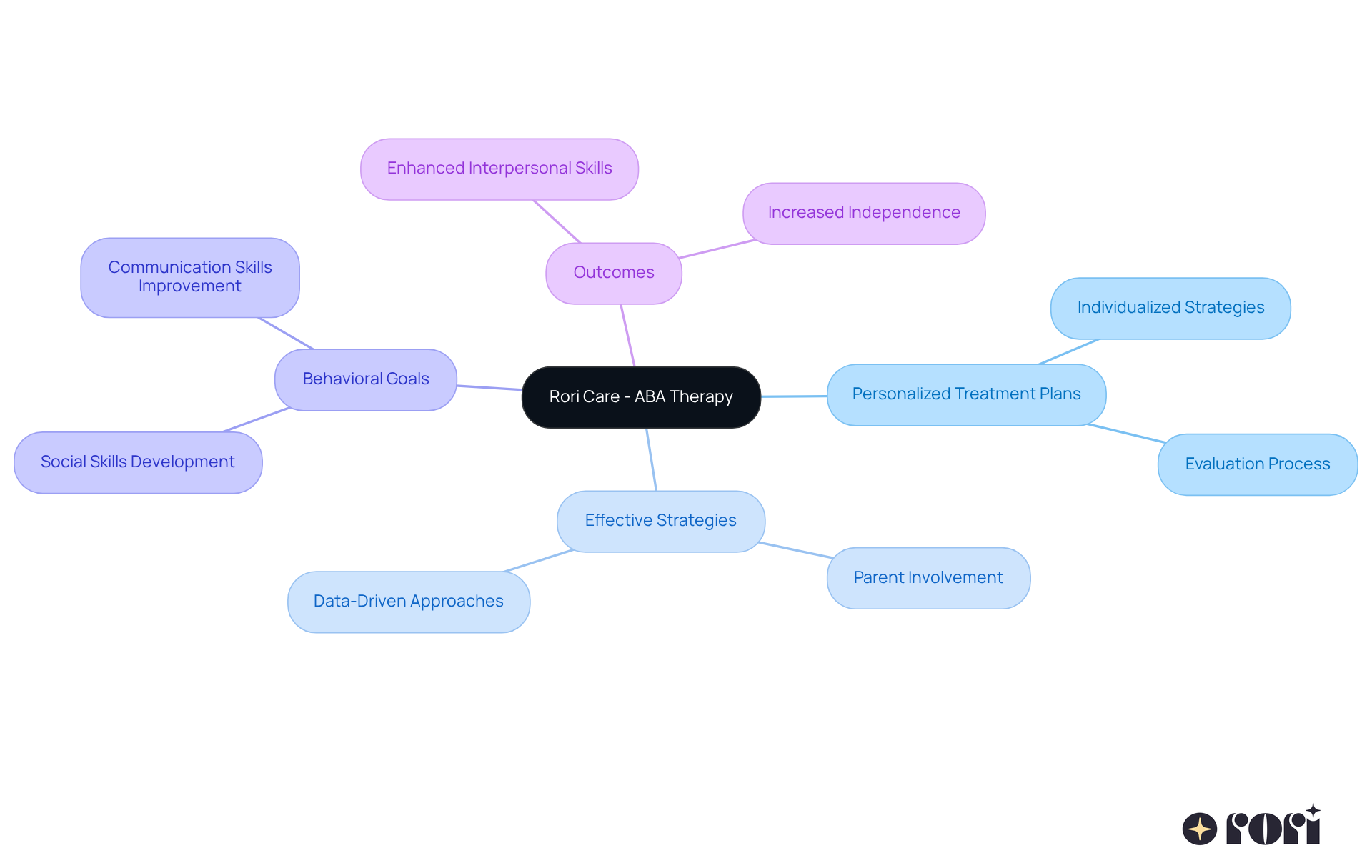
Establishing a reliable daily schedule is among the effective strategies for parents to help their child with autism develop social skills and connect with others! Routines give them a sense of structure, making it easier for them to know what’s coming next. This can really help reduce anxiety and boost their confidence.
Consider that regular playdates, family meals, and fun activities are effective strategies for parents to help their child with autism develop social skills. It’s all about creating a comfortable and nurturing environment where they can thrive. Studies show that organized settings can offer effective strategies for parents to help their child with autism develop social skills by providing the stability they need to flourish.
Plus, having a daily routine can positively impact anxiety levels and community involvement. It’s a vital resource for parents! Experts agree that effective strategies for parents to help their child with autism develop social skills include creating a well-organized environment, which eases anxiety and encourages positive social interactions. This allows our young ones to develop those essential social skills they’ll need as they grow.
And let’s not forget about us, the caregivers! Learning about ABA principles and strategies can really enhance our ability to support our kids’ behavioral goals. By getting involved in their therapy and understanding how learning and behavior work, we can make informed choices that lead to better outcomes and boost our confidence as parents.
So, let’s explore this together! We’re here to help you every step of the way!
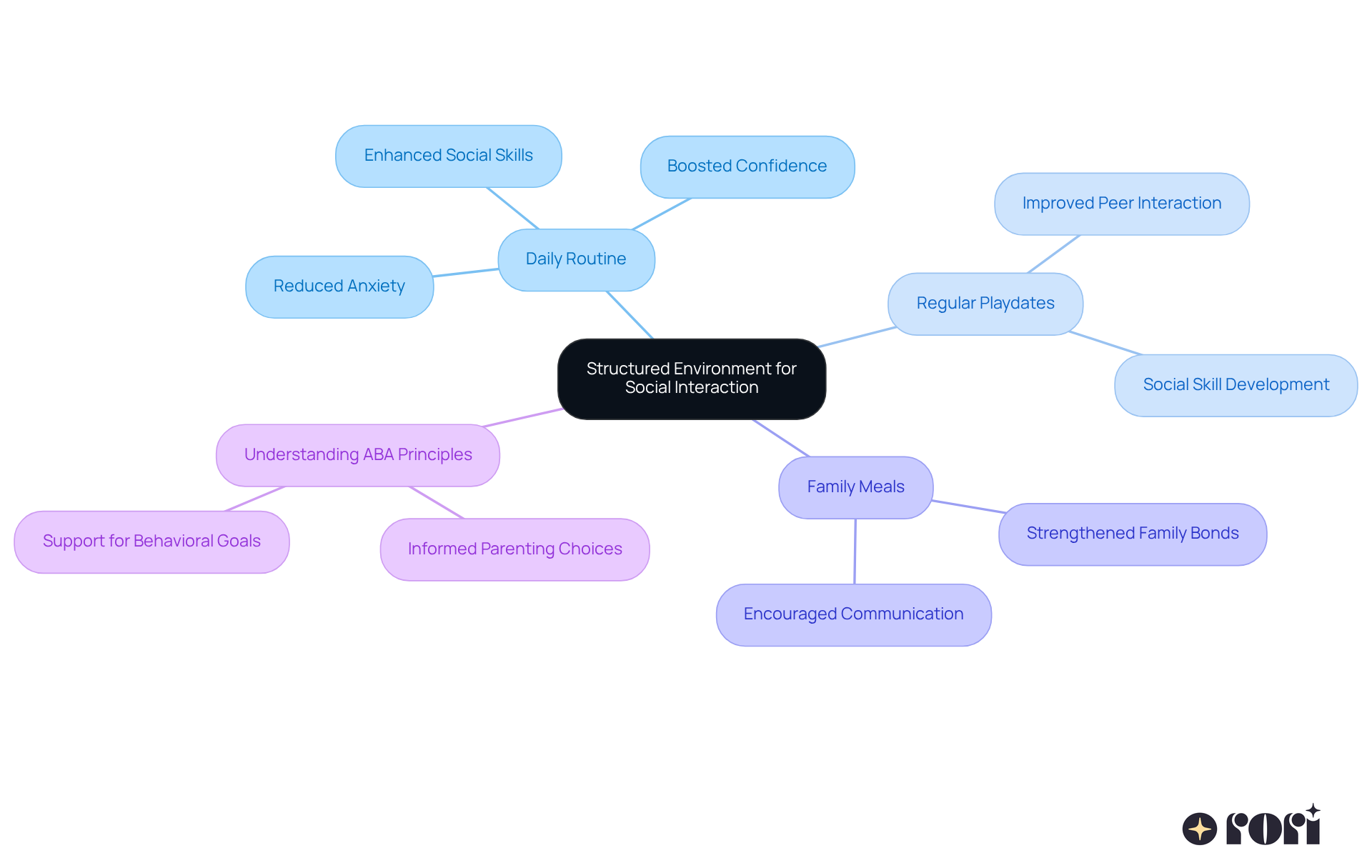
Visual aids like picture schedules, emotion cards, and narratives are game-changers when it comes to helping young people improve their nonverbal communication skills. These tools make it easier to understand social cues and expectations, which can really ease the anxiety that often comes with social interactions. For example, emotion cards help kids recognize and express their feelings, a vital part of developing those all-important interpersonal skills. Research shows that children who regularly use emotion cards see significant improvements in identifying emotions in themselves and others, leading to better social interactions. Speech therapists highlight that these visual aids not only make communication smoother but also boost emotional intelligence, which is key to forming meaningful relationships.
But that’s not all! Participating in skills group therapy led by trained therapists can take communication and relationship-building to the next level. This program is designed for individuals with Autism Spectrum Disorders, ADHD, Communication Disorders, and Anxiety Disorders, helping them build confidence and interpersonal skills. By weaving visual aids into daily routines and joining group therapy, caregivers can create a more structured and supportive environment that empowers their kids to navigate social situations with greater confidence and ease. Plus, educating caregivers is crucial; it equips parents with effective strategies for parents to help their child with autism develop social skills to support their children’s growth.
Let’s explore this together! By embracing these tools and approaches, we can help our kids thrive in their social worlds.
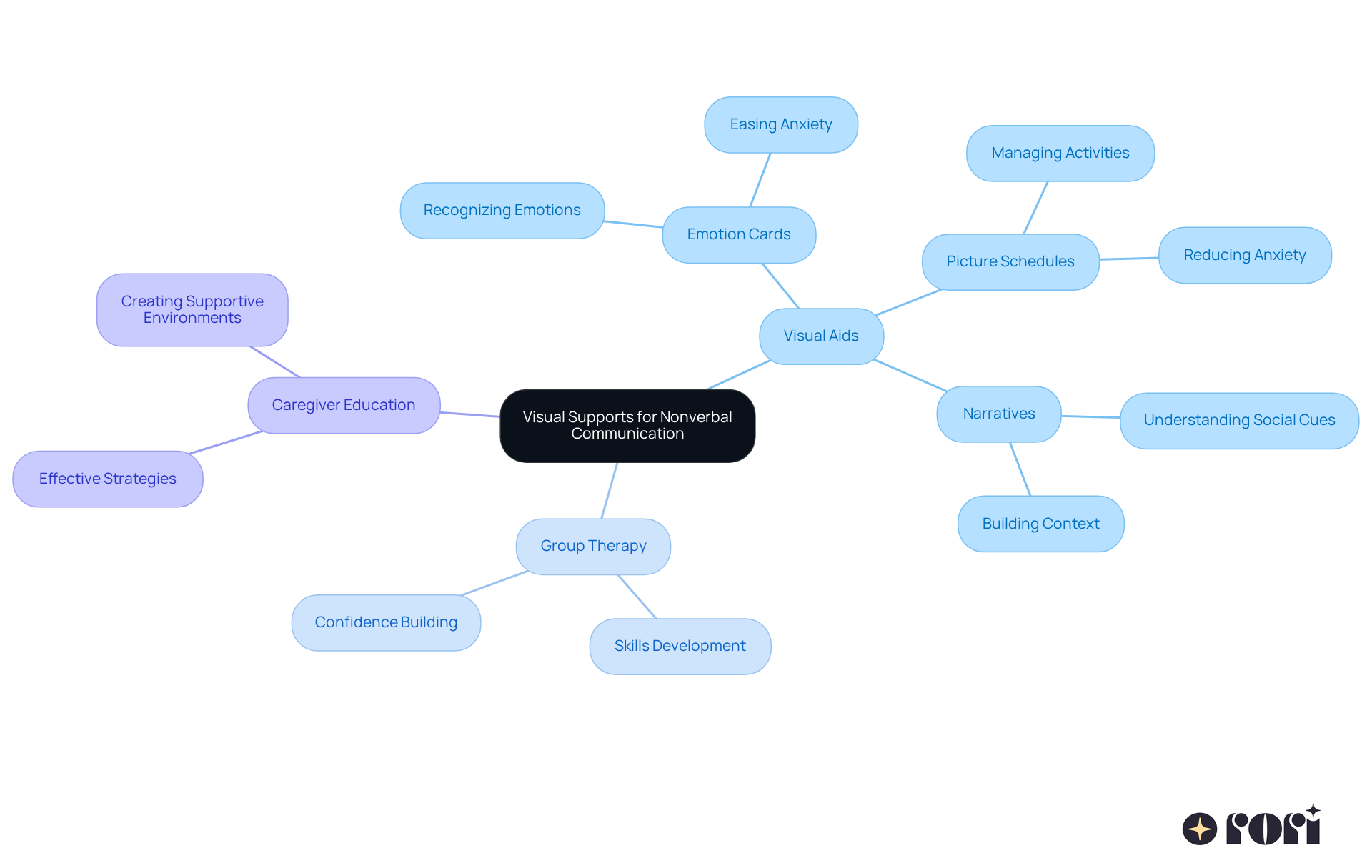
Encouraging peer interaction is among the effective strategies for parents to help their child with autism develop social skills! Arranging playdates or group activities that align with your child's interests is one of the effective strategies for parents to help their child with autism develop social skills and create relaxed moments with classmates. These interactions are effective strategies for parents to help their child with autism develop social skills, as they not only assist kids in practicing starting conversations and sharing interests but also build a sense of belonging and friendship.
Research shows that playdates can really boost interpersonal skills. They offer a great chance to develop essential skills like empathy, cooperation, and turn-taking. Plus, kids who have regular playdates often find themselves interacting more at school and enjoying stronger connections with their peers. By nurturing these positive relationships, parents can utilize effective strategies for parents to help their child with autism develop social skills, which will help their children grow in confidence and lay the groundwork for meaningful friendships.
To make these interactions easier, parents can implement effective strategies for parents to help their child with autism develop social skills by guiding their kids on how to start conversations and suggesting fun activities that align with their interests, like collaborative games or shared hobbies. And don’t forget, learning about ABA principles can equip parents with the tools they need to support their child's development effectively, boosting their confidence and helping them make informed choices that positively impact their growth.
Did you know that children typically start engaging in cooperative play around age 3? That’s why early playdates are so crucial for building those important relationships! A handy tip for parents is to create a simple checklist of conversation starters and activities to help their kids feel more prepared and confident during playdates. Let’s explore this together!
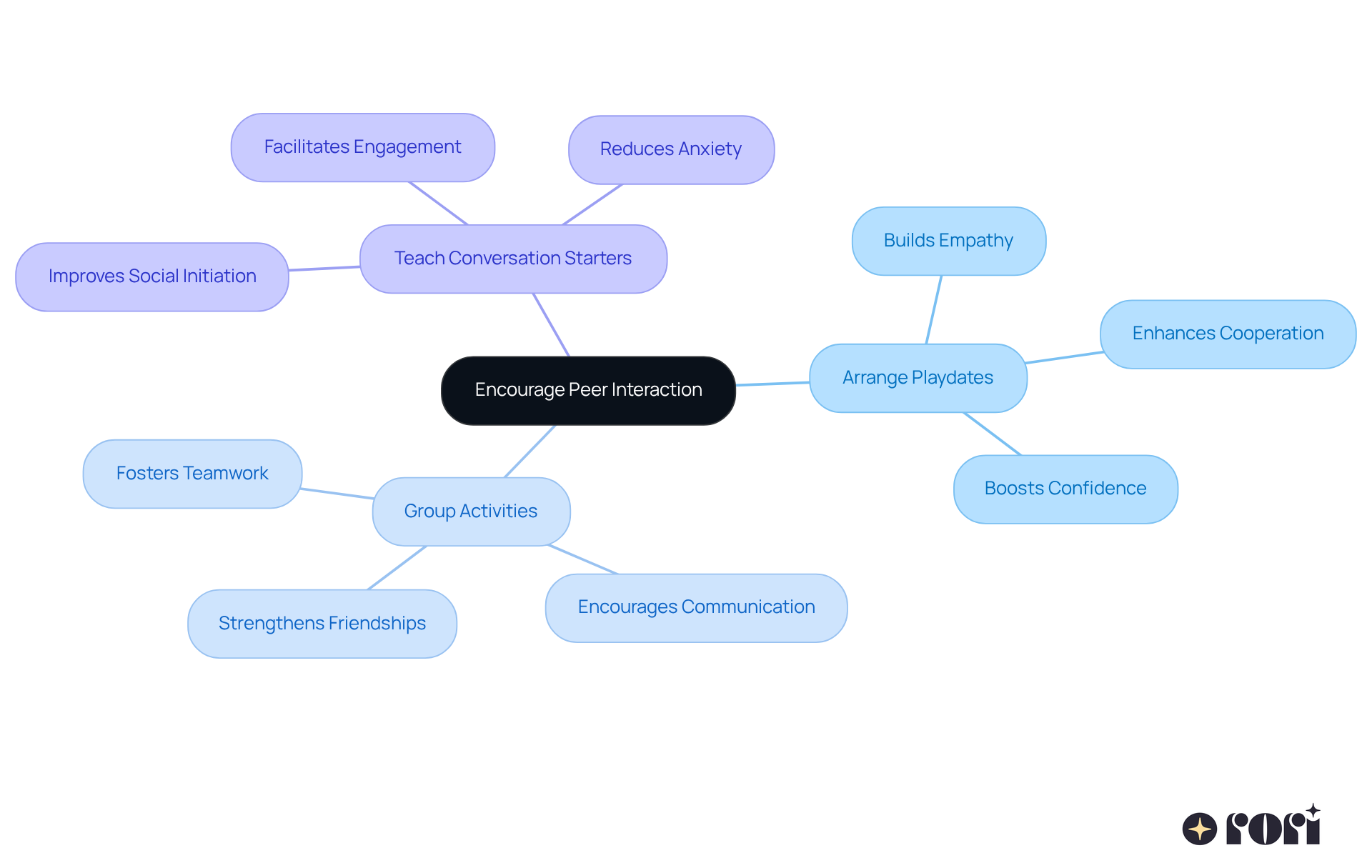
Role-playing is one of the effective strategies for parents to help their child with autism develop social skills, as it is a fantastic tool for teaching interpersonal skills. Imagine creating real-life scenarios - like greeting a friend or asking to join a game - where you can engage your child in meaningful practice. This not only builds their confidence but also helps them grasp important social cues like turn-taking and active listening.
Did you know that studies show role-playing can boost interaction skills in kids with autism by up to 40%? That’s a significant leap! Plus, about 70% of participants see improvements in their communication and behavior with regular practice. Development experts emphasize that practicing social situations in a safe environment allows kids to explore complex concepts like empathy and emotional regulation.
By providing constructive feedback during these role-playing sessions, you can utilize effective strategies for parents to help their child with autism develop social skills more effectively. This ultimately leads to greater self-assurance and interpersonal skills. And if you’re looking for additional support, Rori Care offers group therapy and caregiver education designed specifically for parents. Together, we can enhance your child’s social abilities and overall development. Let’s explore this journey together!
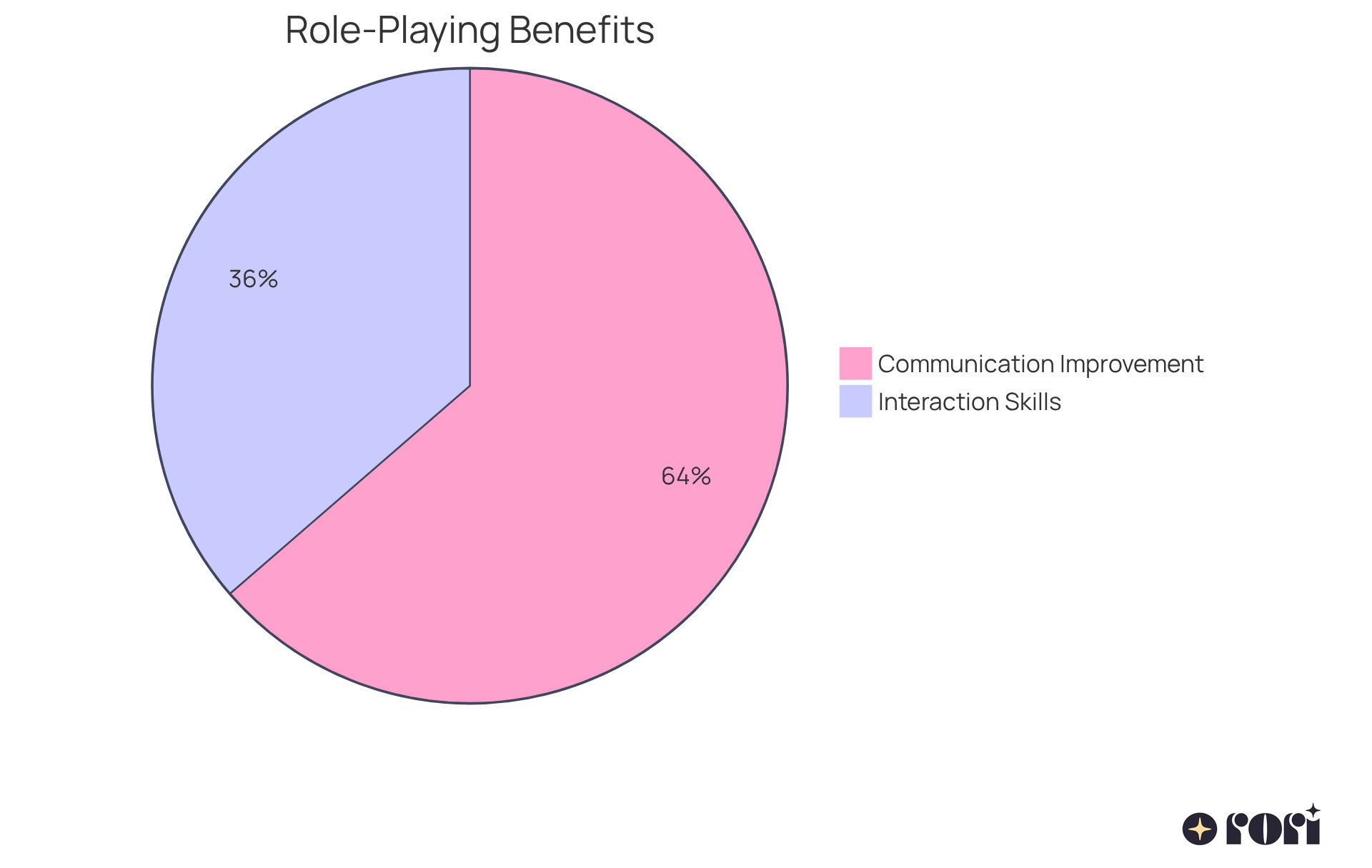
Narratives can be such powerful tools for helping kids understand the norms and expectations of society! These stories paint vivid pictures of how we interact with one another, making it easier for little ones to see what appropriate behaviors look like. For instance, a story about sharing toys can break down the steps involved and the feelings that come with sharing, helping a child grasp these concepts in real-life situations.
Research shows that using narrative techniques can really boost kids' understanding of social cues. In fact, studies have found that about half of the kids who went through narrative training showed improved interaction skills! By sharing these stories, parents can utilize effective strategies for parents to help their child with autism develop social skills, guiding them through social situations, reinforcing positive behaviors, and nurturing better communication skills.
Let’s explore this together! How have stories helped your child navigate their friendships? We’re here to help you every step of the way!
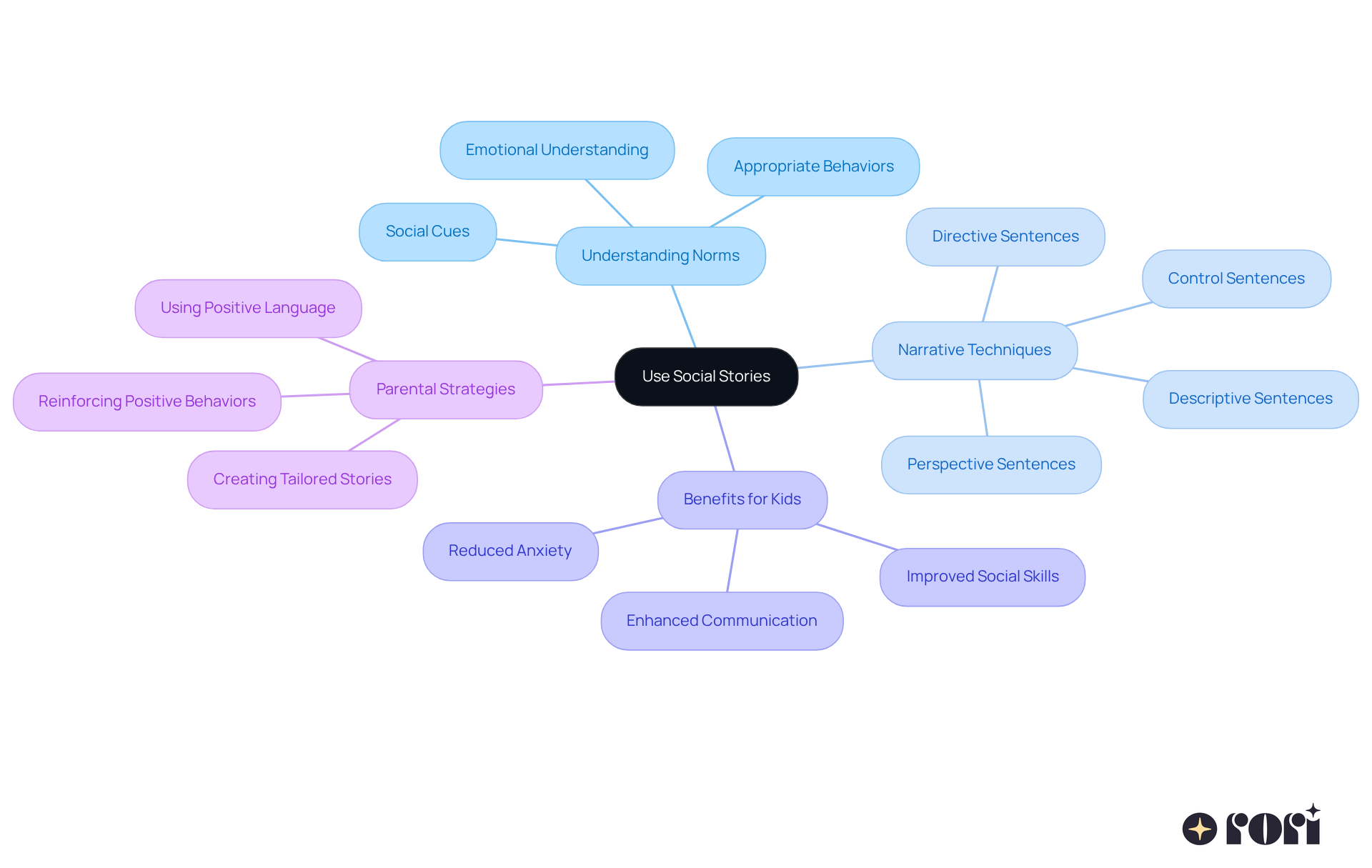
Using technology through apps and games designed for social skills can really make learning fun for kids! 🎉 Interactive platforms that focus on role-playing, recognizing emotions, and communication skills work wonders. For example, apps that simulate social situations let kids practice their responses in a safe, controlled environment, boosting their learning and confidence.
Research shows that kids who use these interactive tools often see significant improvements in their social skills. Many even report feeling better equipped to handle real-life interactions. Creators of educational apps, like Proloquo2Go, emphasize the importance of crafting engaging, user-friendly experiences that cater to the unique needs of individuals on the autism spectrum.
By tapping into these innovative resources, parents can utilize effective strategies for parents to help their child with autism develop social skills. This not only fosters independence but also enhances their overall quality of life. Let’s explore this together and see how we can support our kids on this journey!
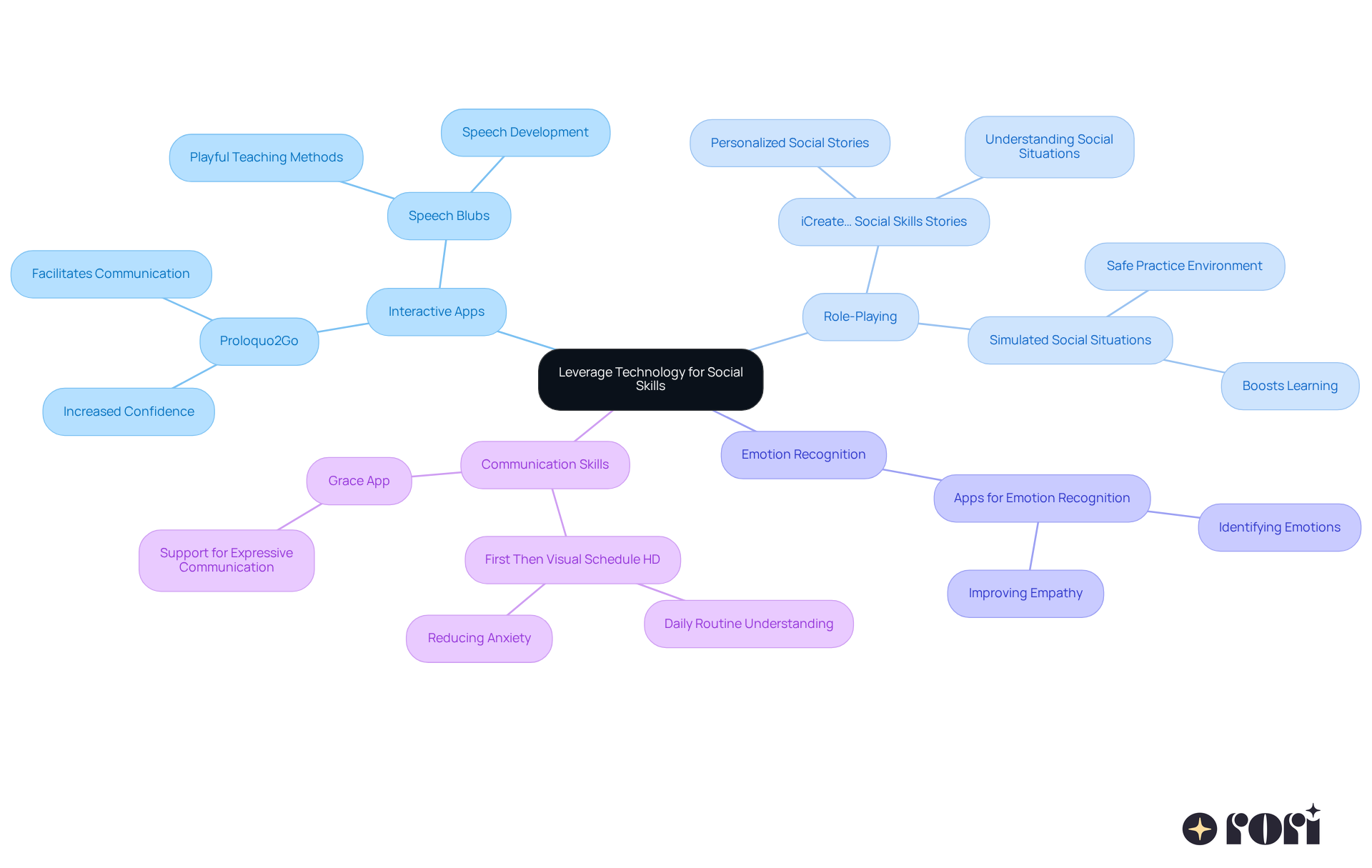
Active parental involvement in training interpersonal skills represents effective strategies for parents to help their child with autism develop social skills! Research shows that effective strategies for parents to help their child with autism develop social skills can lead to significant improvements when parents actively engage in therapy. In fact, studies have noted an average increase of 6.40 points in interaction scores after treatment.
To boost this effect, parents can implement effective strategies for parents to help their child with autism develop social skills by:
By modeling positive social interactions and giving constructive feedback, you are using effective strategies for parents to help their child with autism develop social skills, making it more likely they'll use them in real-life situations. Family therapists emphasize that effective strategies for parents to help their child with autism develop social skills involve parental involvement, which makes kids feel more secure and valued, thus creating a supportive learning environment.
Plus, keeping in touch with therapists about your child's progress can really enhance the effectiveness of effective strategies for parents to help their child with autism develop social skills. Successful approaches, which are effective strategies for parents to help their child with autism develop social skills, include:
This collaborative method not only strengthens the parent-child bond but also offers effective strategies for parents to help their child with autism develop social skills.
Rori Care offers caregiver education programs that equip parents with a solid understanding of ABA principles and strategies. This empowers you to support your child's behavioral goals, leading to better outcomes and confident caregivers who feel great in their role. Let’s explore this together!
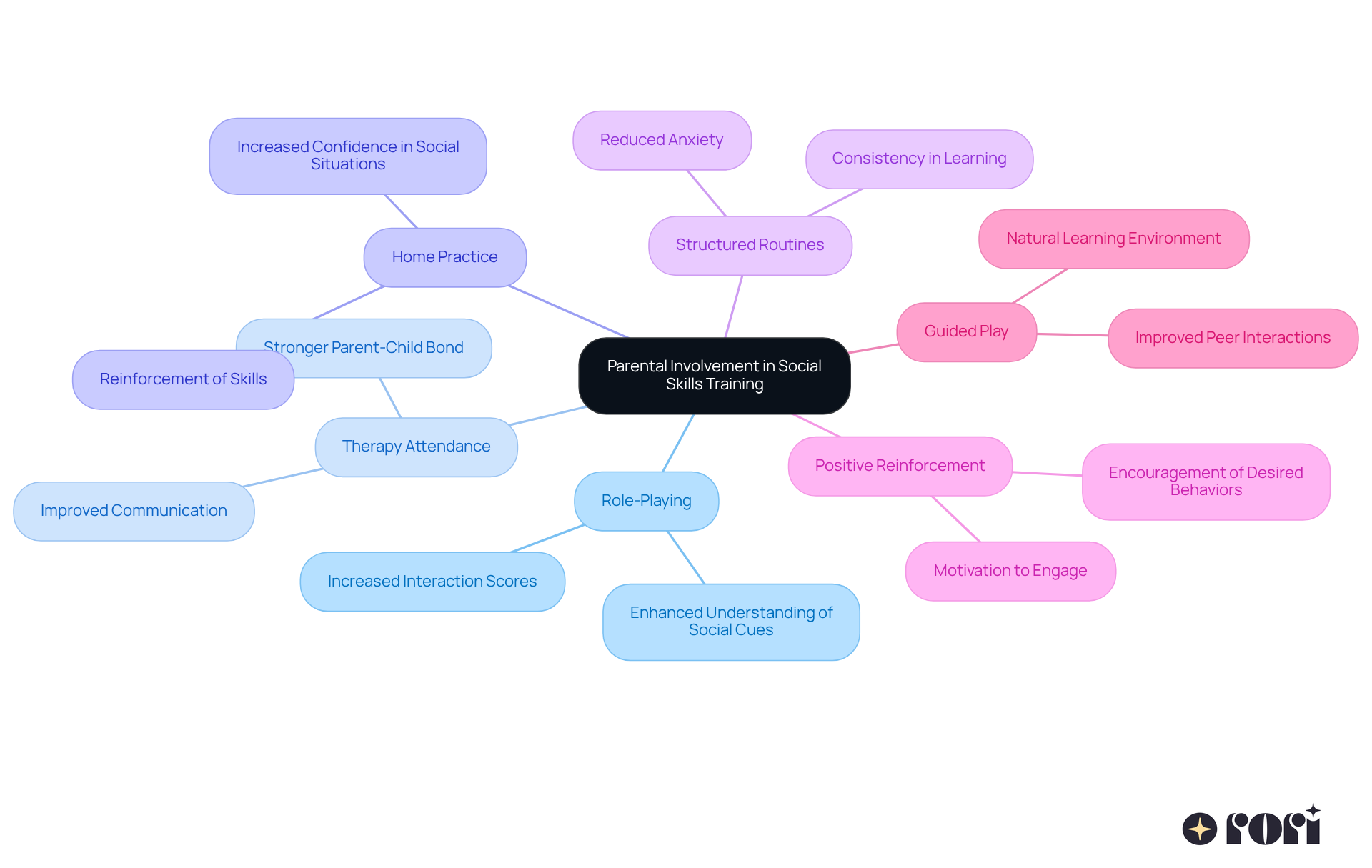
For caregivers aiming to boost their kids' social skills, working together with therapists is one of the effective strategies for parents to help their child with autism develop social skills. When you keep in touch with your child's therapist, it allows for real-time tweaks to the treatment plan. Plus, it ensures that you have personalized strategies to tackle specific challenges. This teamwork creates a nurturing environment where you can actively participate in your child's growth.
Experts emphasize that good communication between caregivers and therapists is key. It helps you support effective strategies for parents to help their child with autism develop social skills at home, creating a unified approach to social development. Research shows that having expert support is among the effective strategies for parents to help their child with autism develop social skills, significantly enhancing the effectiveness of training and leading to better outcomes. By working closely with therapists, parents can gain a deeper understanding of their child's needs and progress, which will help them implement effective strategies for parents to help their child with autism develop social skills.
Let’s explore this together! Remember, you’re not alone on this journey. We’re here to help you every step of the way!
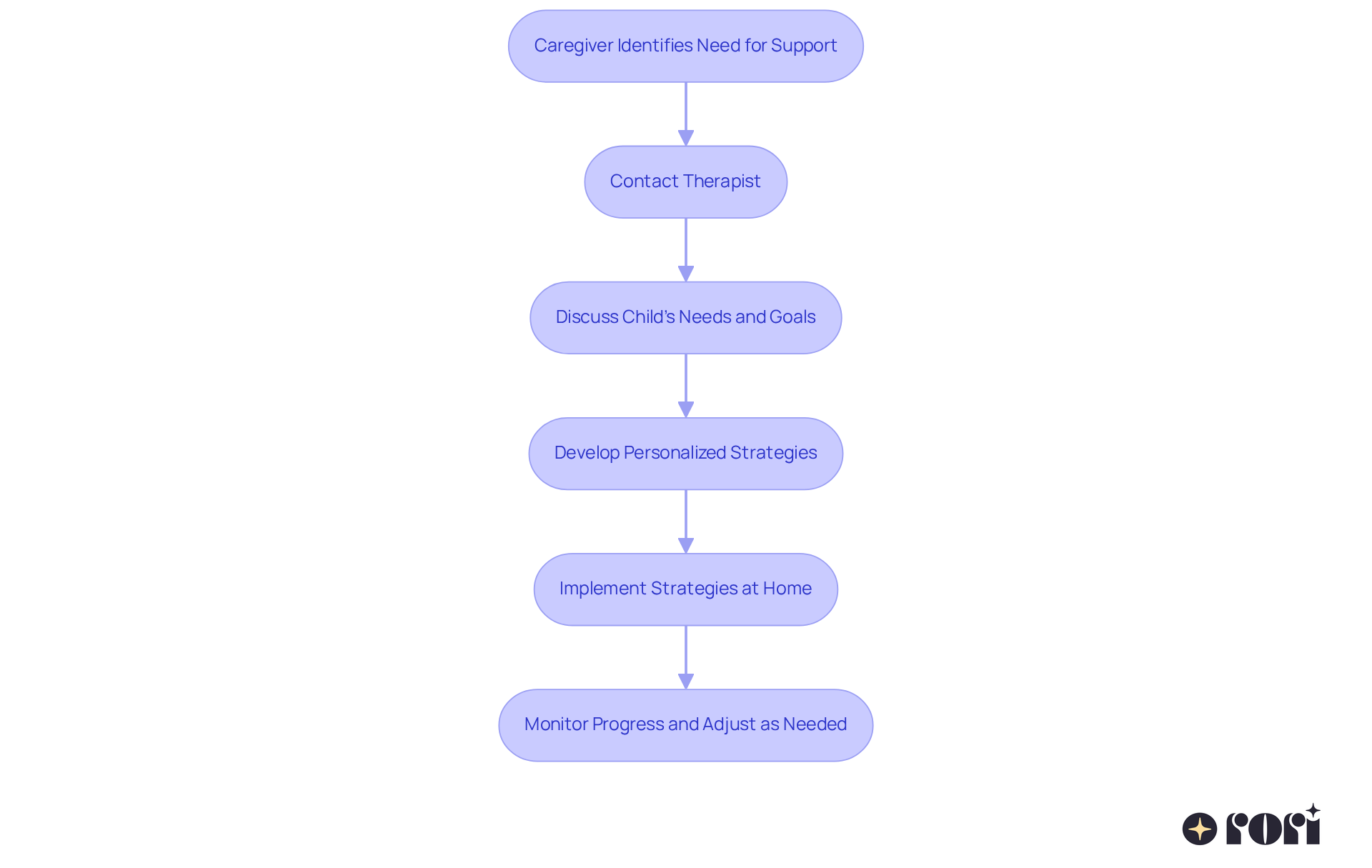
Celebrating your child’s growth in social skills is so important for boosting their motivation and self-esteem! 🎉 Even recognizing small wins, like a successful chat with a friend, can really inspire kids to keep practicing and improving. Plus, when you set up a reward system that aligns with what your child loves, these celebrations become even more meaningful and motivating.
Research shows that positive reinforcement - especially when it’s tailored to what your child enjoys - can really enhance their engagement and encourage them to repeat those great behaviors. For the best results, try to keep a balance of about 5.6 positive comments for every piece of criticism. This kind of balance helps create a supportive learning environment.
By acknowledging achievements - whether through kind words, fun rewards, or special activities - you’re applying effective strategies for parents to help their child with autism develop social skills, which aids in helping your child interact with confidence and joy. This not only reinforces their progress but also builds a positive self-image, which is crucial for their ongoing development in social situations.
As a caregiver, being familiar with effective strategies for parents to help their child with autism develop social skills can really boost your ability to support your child’s behavioral goals. This knowledge can lead to better outcomes and a happier family dynamic. Let’s explore this together!
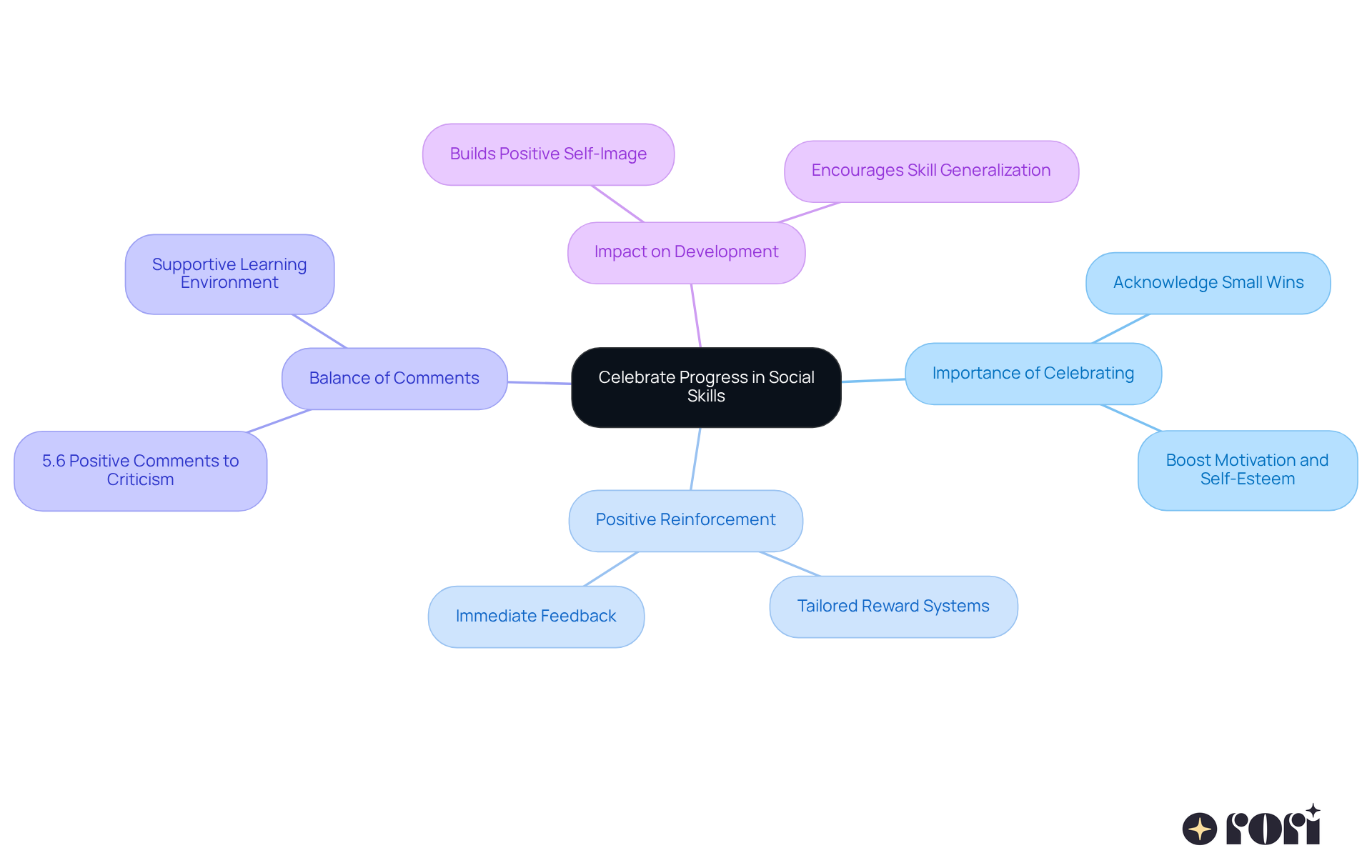
Boosting a child's social skills, especially for those with autism, is a journey that calls for a thoughtful approach. It’s all about combining structured routines, visual supports, and active parental involvement. The strategies we’ve discussed highlight how personalized treatment plans, like ABA therapy, can cater to each child's unique needs. By creating a supportive environment filled with chances for practice and reinforcement, parents can really help their children navigate social interactions with confidence.
Let’s take a moment to reflect on some key insights:
In conclusion, enhancing a child's social skills is truly a collaborative effort. It involves parents, therapists, and tailored strategies working together. By embracing these effective approaches, caregivers can empower their children to forge meaningful connections and thrive in social settings. Remember, celebrating progress and reinforcing achievements is key to fostering a positive trajectory for social development. Together, let’s ensure that every child has the tools and support they need to succeed in their social world! We’re here to help you every step of the way!
What is Rori Care's approach to helping children with autism develop social skills?
Rori Care utilizes Applied Behavior Analysis (ABA) therapy to create personalized treatment plans that focus on improving interpersonal skills in children with autism. Each plan is tailored to meet the specific needs and strengths of the child.
Why is a personalized approach important in ABA therapy?
A personalized approach is important because it incorporates effective strategies that enhance engagement and outcomes. Research shows that customized interventions can lead to significant improvements in communication and social skills for young individuals.
How can establishing a routine benefit children with autism?
Establishing a reliable daily schedule provides structure, reducing anxiety and boosting confidence. Regular activities like playdates and family meals create a nurturing environment that supports social skills development.
What role do visual supports play in developing nonverbal communication skills?
Visual supports, such as picture schedules and emotion cards, help children understand social cues and expectations, easing anxiety in social interactions. These tools also improve emotional intelligence, which is crucial for forming meaningful relationships.
How can group therapy enhance social skills for children with autism?
Group therapy, led by trained therapists, is designed to help children with Autism Spectrum Disorders and other communication challenges build confidence and interpersonal skills. It provides a structured environment for practicing social interactions.
What can caregivers do to support their children's social skills development?
Caregivers can learn about ABA principles and strategies to enhance their ability to support their child's behavioral goals. Understanding these strategies enables parents to make informed choices that lead to better outcomes for their children.
How does Rori Care support parents in this journey?
Rori Care is dedicated to providing personalized care and support for parents, guiding them through effective strategies to help their children develop social skills and encouraging their involvement in the therapeutic process.